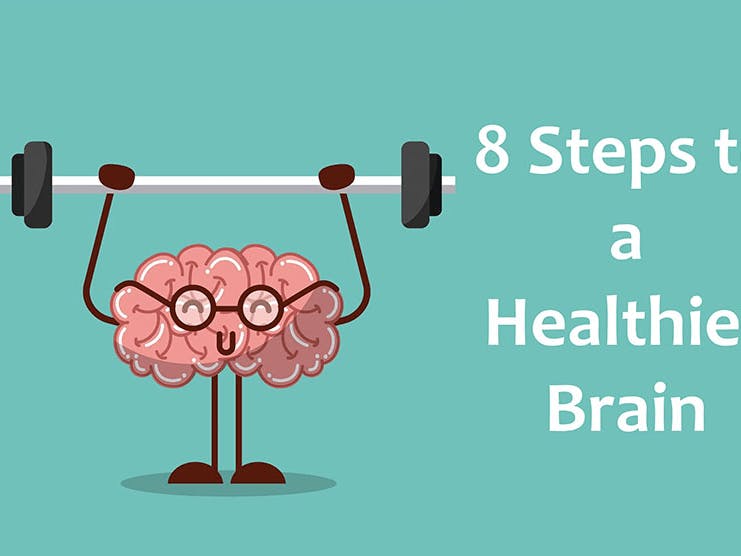
Cognitive decline may be a natural part of aging, but that doesn't mean you can't take steps to slow it.
Like eyesight, cognitive decline begins in your thirties. This deterioration impacts more than memory. Your ability to focus, multitask, balance, and even how you respond to common stressors are all affected by brain health.
While cognitive decline is a natural part of aging, there are steps you can take to boost brain health. As with overall wellness, following a healthy lifestyle plays a large role in improving cognitive function.
What Is Healthy Brain Function?
There are four main components to brain health:
- Cognitive: Your ability to think, learn, and remember
- Emotional: Your ability to interpret and respond to emotions, including joy, fear, anger, love, and sadness
- Motor function: Your sense of balance and ability to control bodily movements
- Tactile function: Your ability to sense and respond to physical sensations like pain, temperature, and pressure
As we age, all of these functions begin to decline. However, although age-related cognitive decline is inevitable, healthy lifestyle changes may help slow that deterioration.
Activities to Improve Cognitive Health
Researchers have long been interested in whether and how humans may be able to improve their cognitive health. The following activities are backed by the National Institute on Aging and Harvard Medical School as being beneficial to improving and promoting cognitive function.
1. Manage Your Physical Health
Brain health starts with staying on top of your overall physical wellbeing. That means managing chronic conditions like high blood pressure, diabetes, high cholesterol, and depression. You should also talk to your doctor about the potential side effects of any medications you take, including how they interact with each other.
It's also important to limit alcohol intake (that means no more than one to two drinks per day for men and only one for women). Not only does alcohol directly affect the brain by interrupting neural signals (the communication web between your body and brain), but it also raises your risk of injury and exacerbates other conditions, like diabetes and high blood pressure.
Finally, stop smoking, vaping, and/or chewing tobacco. Nicotine causes blood vessels to constrict, raising blood pressure and inhibiting circulation.
Medicare beneficiaries qualify for a variety of preventive services to help you make these healthy lifestyle changes. Start with your Annual Wellness Exam to get a better handle on your current state of health. You can also take advantage of covered services like nutrition therapy, tobacco use cessation, and diabetes self-management training. Find the full list of Medicare's preventive screenings and services here.
2. Be Physically Active
Physical activity has a tremendous impact on brain health, with regular exercise leading to increased growth of blood vessels that carry oxygen to the brain. It also speeds the development of nerve cells, facilitating faster communication between the nerves and the brain. People who exercise regularly have a demonstrably improved ability to learn, remember, and apply knowledge.
Exercise also helps improve balance, lowering your risk of falling and other acute injuries. It's also great for managing chronic conditions like diabetes and blood pressure, as well as reducing stress.
At a minimum, you should spend one hour a day being physically active. Anything that gets you up and around counts – household chores, gardening, taking the dog for a walk. In addition, you want to add 30 minutes per day of moderate aerobic activity. Walking, biking, swimming, dancing, yoga, whatever activities you enjoy the most work best. If possible, include weight-bearing activities to build bone and muscle strength. (Biking and swimming don't count as weight-bearing, but a walk around the neighborhood does.)
3. Follow a Healthy Diet
You already know that a healthy diet is good for both your heart and your waistline, but did you know it also benefits your brain? People who follow the Mediterranean diet seem to have a lower risk of dementia and Alzheimer's disease. In general, doctors recommend the following:
- 5 to 7 servings of fruits and vegetables each day
- Whole grains and complex carbohydrates instead of simple carbs like white bread and pasta
- Protein from lean meats, poultry, fish, and plants like beans, lentils, and nuts
- Low-fat and/or nonfat dairy products
- Plenty of water
Eat as much "real" food as possible, meaning cut out the processed food items. And avoid salt, sugars, and solid fats.
Before making big changes to your diet and exercise routines, talk to your doctor.
4. Engage Your Mind
When we learn new things, it causes our brains to create new neurological pathways and may even stimulate the growth of new brain cells. Doctors believe this builds a reserve of healthy brain cells and helps make your brain more adaptable.
Mentally stimulating activities do the most to build your brain. Take a class at your local community college (most offer reduced prices for seniors), join a book club, learn a new language, teach a class, or find a new hobby that requires manual dexterity, like drawing or painting. You could also learn a new sport, which would incorporate two memory boosting activities – mental stimulation and physical activity.
5. Spend Time with Other People
People who have strong social ties enjoy a variety of health benefits, including lower risk of dementia and a longer life expectancy.
As above, spending time with others could fulfill multiple items on this list. Joining a book club stimulates your mind (reading) while also connecting you with others. Taking a class – or teaching one yourself – is another great option. Join a community softball team, a sewing circle, bird watching group, photography club – whatever interests you, there's sure to be a group of like-minded individuals somewhere.
If you aren't sure where to begin, there are a number of options:
- Your local community center, senior center, or library
- National Association of Area Agencies on Aging
- MeetUp.com lets you enter your interests to find social groups, hiking clubs, hobbies, and much more
- Volunteer work
If safety is a concern, don't worry. Technology has made it easier than ever to build social networks without ever leaving your house. Book clubs, crochet circles, art classes – you can find online groups for just about every interest. And, of course, don't neglect your family and friends. Make time every week to spend time with those you care about – even if it's a weekly cup of coffee or happy hour over Zoom or Skype.
6. Deal with Stress
Stress is unavoidable. And, in small doses, it's actually a good thing. Stress helps your brain recognize threats, adapt to your environment, and devise an appropriate response. But chronic stress may raise your risk of Alzheimer's disease, dementia, and even change your brain, negatively impacting synapses, cognitive function, the immune system, and more.
One of the fastest ways to reduce stress is to get moving. Physical exercise helps work off stress and anxiety. But it can also physically calm you, particularly activities like taking a walk or hike, or practicing yoga or tai chi.
Another stress-busting technique is journaling. Writing in a journal lets you walk through any issues you're experiencing and often find a new solution. Or, you may be able to finally let go of an old hurt or other unwanted emotion. Meditation and other relaxation techniques are also good stress relievers.
Many people also find it helpful to focus on everything they have to be grateful for. Do you know where you're going to sleep tonight? You're better off than millions of Americans. Know where your next meal is coming from? There are literally a billion people in the world who can't say the same thing. Make a gratitude list and focus on the simple pleasures you enjoy.
7. Get Creative
Creative endeavors make it easy to keep your mind active. Writing, drawing, painting, wood working, knitting, crocheting – your options are practically limitless. And with the internet, finding a class takes only a few minutes. For example, you'll find literally thousands of videos on YouTube for all of the creative activities listed above. And don't forget your local community center or college, both of which usually offer reduced rates for seniors – and sometimes you'll pay nothing at all.
8. Get Your 40 Winks Every Night
Sleep is when your body repairs itself. Lack of sleep may cause memory problems, depression, irritability, and raise your risk of falling. Unfortunately, people often find sleeping more difficult as they get older. There are many reasons – life is no longer regimented as it was before retirement, medications often have sleep-related side effects, stress and worry may inhibit sleep.
You can improve your chance of getting a good night's sleep by:
- Using your bedroom only for sleep and sex
- Going to sleep and waking at the same time every day
- Not taking a nap after 3 or 4 PM
- Create a bedtime routine that you follow every night, such as taking a bath, reading a book, or writing in your journal
- Meditating or following another relaxation technique
- Turning off electronic devices – including phones, TVs, tablets, and computers – at least an hour before bed
- Keeping your bedroom at a comfortable temperature and the lights relatively low
- Avoiding caffeine and large meals late in the day
Your goal is to get 7 to 9 hours of restful sleep each night. Plan to start your bedtime routine at least an hour before you want to fall asleep. If you lie in bed for 15 to 20 minutes and still can't sleep, move to a chair. Try journaling or reading until you feel drowsy enough to sleep.
Do Games That Claim to Boost Memory Actually Help?
We read a lot about online games that can make you smarter, boost memory, and similar claims. But do they really help?
Unfortunately, there's no evidence to show that playing games on your phone or other device increases brain health.
This doesn't mean that you shouldn't play games on your favorite device. If you enjoy them, it could be a way for you to relax and destress. But don't assume that these games will keep your mind young. It's also important you don't spend too much time on them, since we've already discussed the importance of physical activity.
If you're worried about declining cognitive function, talk to your doctor right away. It could be something as simple as changing your medication. And always talk to your primary care doctor before starting a new diet or exercise program.
Additional Resources
Cognitive Health and Older Adults
External Website Link
12 Ways to Keep Your Brain Young
External Website Link
Exercise Training Increases Size of Hippocampus and Improves Memory
External Website Link
Neurobiological and Systemic Effects of Chronic Stress
External Website Link
The Brain Exercise You Should Do Every Day
Internal Website Link
Speak with a Licensed Insurance Agent
Mon-Fri 8:00am-8:00pm | Sat 9:00am-5:00pm EST



